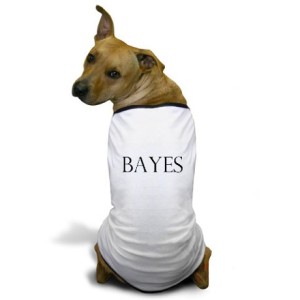Why I am not a Bayesian Assume you’re a Bayesian turkey and hold a nonzero probability belief in hypothesis H that “people are nice vegetarians that do not eat turkeys and that every day I see the sun rises confirms my belief.” For every day you survive, you update your belief according to Bayes’ Rule P(H|e) = [P(e|H)P(H)]/P(e), where evidence e stands for “not being eaten” and P(e|H) = 1. Given that there do exist other hypotheses than H, P(e) is less than 1 and so P(H|e) is greater than P(H). Every day you survive increases your probability belief that you will not be eaten. This is totally rational according to the Bayesian definition of rationality. Unfortunately — as Bertrand Russell famously noticed — for every day that goes by, the traditional
Topics:
Lars Pålsson Syll considers the following as important: Statistics & Econometrics
This could be interesting, too:
Lars Pålsson Syll writes Keynes’ critique of econometrics is still valid
Lars Pålsson Syll writes The history of random walks
Lars Pålsson Syll writes The history of econometrics
Lars Pålsson Syll writes What statistics teachers get wrong!
Why I am not a Bayesian
Assume you’re a Bayesian turkey and hold a nonzero probability belief in hypothesis H that “people are nice vegetarians that do not eat turkeys and that every day I see the sun rises confirms my belief.” For every day you survive, you update your belief according to Bayes’ Rule
P(H|e) = [P(e|H)P(H)]/P(e),
where evidence e stands for “not being eaten” and P(e|H) = 1. Given that there do exist other hypotheses than H, P(e) is less than 1 and so P(H|e) is greater than P(H). Every day you survive increases your probability belief that you will not be eaten. This is totally rational according to the Bayesian definition of rationality. Unfortunately — as Bertrand Russell famously noticed — for every day that goes by, the traditional Christmas dinner also gets closer and closer …
Mainstream economics nowadays usually assumes that agents that have to make choices under conditions of uncertainty behave according to Bayesian rules — that is, they maximise expected utility with respect to some subjective probability measure that is continually updated according to Bayes’ theorem. If not, they are supposed to be irrational.
 Bayesianism reduces questions of rationality to questions of internal consistency (coherence) of beliefs, but — even granted this questionable reductionism — do rational agents really have to be Bayesian?
Bayesianism reduces questions of rationality to questions of internal consistency (coherence) of beliefs, but — even granted this questionable reductionism — do rational agents really have to be Bayesian?
The nodal point here is — of course — that although Bayes’ Rule is mathematically unquestionable, that doesn’t qualify it as indisputably applicable to scientific questions. As one of my favourite statistics bloggers — Andrew Gelman — puts it:
The fundamental objections to Bayesian methods are twofold: on one hand, Bayesian methods are presented as an automatic inference engine, and this raises suspicion in anyone with applied experience, who realizes that different methods work well in different settings … The second objection to Bayes comes from the opposite direction and addresses the subjective strand of Bayesian inference: the idea that prior and posterior distributions represent subjective states of knowledge …
Beyond these objections is a general impression of the shoddiness of some Bayesian analyses, combined with a feeling that Bayesian methods are being oversold as an all-purpose statistical solution to genuinely hard problems. Compared to classical inference, which focuses on how to extract the information available in data, Bayesian methods seem to quickly move to elaborate computation …
Bayesian inference is a coherent mathematical theory but I don’t trust it in scientific applications. Subjective prior distributions don’t transfer well from person to person, and there’s no good objective principle for choosing a noninformative prior (even if that concept were mathematically defined, which it’s not). Where do prior distributions come from, anyway? I don’t trust them and I see no reason to recommend that other people do, just so that I can have the warm feeling of philosophical coherence …
